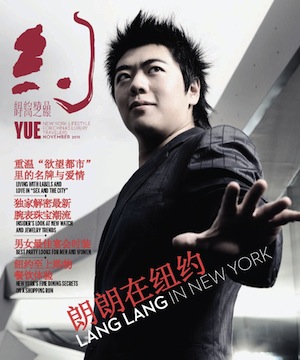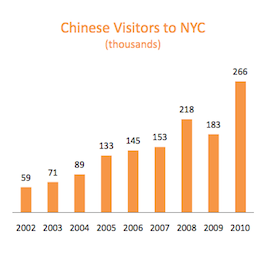 In the span of a decade, the number of visitors to New York City from China more than quadrupled. Ten years ago, 59,000 Chinese tourists visited the city. By 2010, the tally was at 266,000, according to the most recent data from the tourism research firm NYC & Company.
In the span of a decade, the number of visitors to New York City from China more than quadrupled. Ten years ago, 59,000 Chinese tourists visited the city. By 2010, the tally was at 266,000, according to the most recent data from the tourism research firm NYC & Company.
This wave of new visitors has brought an influx of cash to an otherwise recession-addled retail market. But the jump in visitors from China has also presented a magazine publishing opportunity.
In November, Observer Media Group — parent company of The New York Observer — and China Happenings jointly launched YUE, a bilingual Mandarin-English luxury magazine aimed at those affluent Chinese visitors and influential Chinese Americans in the tri-state area. Editor Chiu-Ti Jansen says YUE takes editorial cues from publications like Vogue and Departures, but serves a niche audience that hasn’t yet been served by the luxury magazine market.
It’s not just expanding into a niche — it’s expanding into another language. At a time when U.S. and U.K. publishers are looking for expansion overseas and international publishers want to break into English, Observer Media is pursuing a linguistic opportunity in its own neighborhood.
“We cater to the Chinese, and we do it in a bilingual way,” Jansen says. “Another thing is, the predecessors of Chinese publications in this country, they all end up being very culturally, traditionally Chinese. I never envisioned this as an ethnic publication. I know it’s a niche publication, but we start to be able to interact with both the U.S. and Chinese audiences in a much more avant-garde way. I call it a Chinese sensitivity: we are very sensitive to Chinese interests but it’s an international outlook…These people are not interested in coming to New York and shop like a Chinese [person]. What they are interested in is to learn to live as an international.”
One major area of focus is contemporary arts and culture: “Art buying is the ultimate symbol of luxury consumption in China,” says Jansen, who also looks for profile subjects who bridge the gap between East and West.
“We started with [pianist] Lang Lang, and then we had [designer] Jason Wu, and next issue our cover story will be [actor] Lucy Liu,” Jansen says. “You cannot just throw a New York or U.S. celebrity on the cover…But we also stretch the connections they know, and we challenge them.”
 The magazine printed 35,000 copies for each of its first two issues, which were distributed to tour companies, luxury hotels, Chinese cultural centers in New York, as well as sent to about 8,000 Mandarin-speaking homes in the area. Those “very, very high end” readers include hedge fund managers and board members of New York’s major institutions. Getting advertisers like Chanel and Fendi was “a fairly easy sell” as a result, according to New York Observer editor Elizabeth Spiers.
The magazine printed 35,000 copies for each of its first two issues, which were distributed to tour companies, luxury hotels, Chinese cultural centers in New York, as well as sent to about 8,000 Mandarin-speaking homes in the area. Those “very, very high end” readers include hedge fund managers and board members of New York’s major institutions. Getting advertisers like Chanel and Fendi was “a fairly easy sell” as a result, according to New York Observer editor Elizabeth Spiers.
“We have a lot of ancillary publications that have targeted a similarly high-income, affluent, well-educated demographic,” Spiers told me. “But YUE is original because we were looking at the luxury market from the business side of things, given the demand for luxury goods in New York among Chinese tourists.”
(In Chinese, “yue” means “invitation, promise, and rendezvous,” Observer Media says. It’s also the second half of Niu Yue, the Chinese name for New York.)
Spiers says YUE has been “very successful,” enough so that Observer Media Group is mulling the launch of a Los Angeles edition, as well as a location-based app that would serve as a food and retail guide for visitors.
 “It’s something we’ve discussed, [but] we don’t have it in the works right now,” Spiers said. “You’ll notice that [YUE] is very product-heavy. It sort of tells you where to go to do your shopping and eating, so we’re thinking it probably makes sense at some point to integrate with a mobile app.”
“It’s something we’ve discussed, [but] we don’t have it in the works right now,” Spiers said. “You’ll notice that [YUE] is very product-heavy. It sort of tells you where to go to do your shopping and eating, so we’re thinking it probably makes sense at some point to integrate with a mobile app.”
In the meantime, YUE has snagged top luxury advertisers that have been otherwise elusive for Observer Media Group. The pages of YUE — both editorial and advertising — are lined with pricy ideas on how you can reinvent your wardrobe: Ralph Lauren ball gowns, Chanel diamond rings, Harry Winston watches, and J. Mendel minks.
“We have a lot of fashion, watches, jewelry, and shopping-related information because this is their No. 1 priority,” Jansen says. “According to New York City statistics, Chinese rank shopping first as opposed to food or concerts or other types of activities. We know we need to satisfy their interest in this aspect. I am fully aware of where their tastes stand, but I think the Chinese taste is evolving very, very fast. We have to convey the same message to our advertisers so they don’t have a fixed idea of what the Chinese want, because it’s a work in progress.”